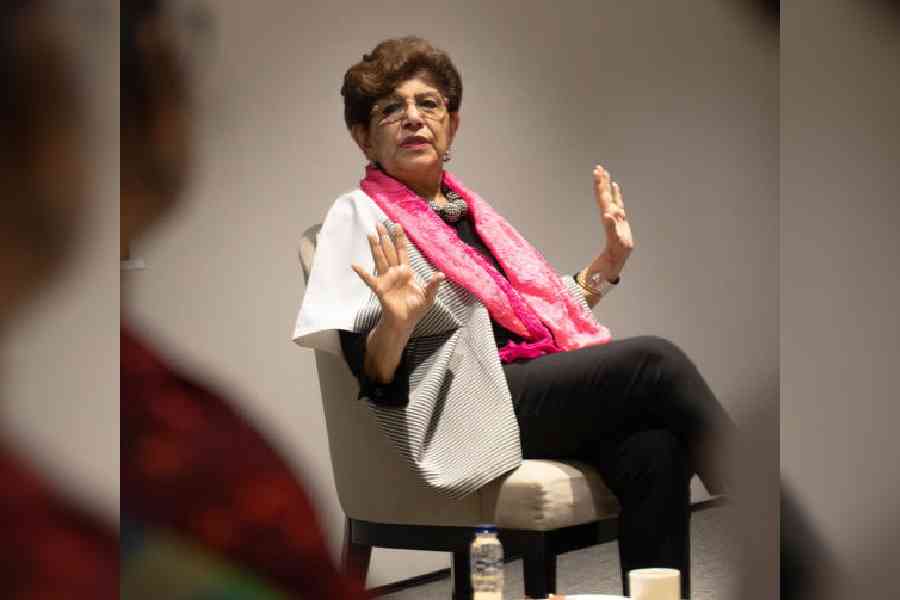There is little wonder that Amal Allana should have been chosen to be on multiple panels to talk about Bertolt Brecht on the occasion of his 125th birth anniversary. She was in Calcutta at the invitation of the Kolkata Centre for Creativity’s programme.
As daughter of Ebrahim Alkazi, founder-director of the National School of Drama (NSD), and herself an NSD chairperson for two consecutive terms, Allana is steeped
in theatre.
She and Calcutta are no strangers to each other. “I have brought my plays here, most notably Noti Binodini and before that I brought Sonata by Mahesh Elkunchwar and Garcia Marquez’s The Incredible and Sad Tale of Innocent Eréndira and Her Heartless Grandmother. I am running the Heritage Art Gallery in Delhi that my parents had started. In that connection too I come here,” she says.
At 75, Allana says she likes being who she is. She talks about how her mother Roshan took her and brother Feisal to south India, where she got to meet the Bharatnatyam exponent Bala Saraswathi. She says, “Literature, poetic expression whether Shakespeare or Dharamvir Bharati’s Andha Yug, all these things percolated into one’s consciousness...”
Allana continues, “Our lives were such that it was always the play that was very important. There were always deadlines and discipline involved. My parents were nowhere near being bohemian. They were very grounded, very disciplined and theatre was work. It was very hard work and so was meeting those deadlines, confronting an audience, learning to live with criticism in the press...”
Allana joined NSD at 17, right after school, not quite in keeping with her father’s wishes. He had wanted her to finish her bachelor’s and master’s first. It was there that she made her first acquaintance with Brecht.
She says, “I took to this crazy man, who seemed to be doing a new, odd kind of theatre... It was very confusing for me to grasp. All the characters in his plays had crazy names. Everything was
taking place in the land of pagodas or in Chicago, the land of gangsters, or in Victorian England.”
From being confused, Allana came to study Brecht assiduously. She selected the Brecht play Ele- phant Calf for her diploma production and when she graduated from NSD, she won a scholarship to go to the German Democratic Republic (GDR) to study Brechtian theatre. “I was there from 1969 to 1971. Brecht died in 1956. It had been 15 years since he died. And all his students, who had been his assistant directors, had grown up and some of them became brilliant directors. I had an opportunity to see rehearsals of their plays from start to finish,” says Allana.
In one of her trips to GDR she met Fritz Bennewitz, the director of the National Theatre of Weimar. He was invited by NSD to perform in India.
Recalls Allana, “He was very excited and he came waving the letter of invitation. ‘I have been invited to do a play in India and I am going to take you there and you are going to be my assistant director,’ he said. So I came to India in the middle of my scholarship programme. I was the assistant director and costume designer of The Threepenny Opera, which was the second Brecht play that NSD did.” The first was The Caucasian Chalk Circle.
Years later, when Allana started her own theatre group, her first production was Brecht’s A Man’s A Man.
Allana talks about Calcutta’s tradition of theatre, Maharashtra’s too; Delhi, she says, was a “barren” place till NSD arrived. “We didn’t have a commercial theatre in the north. It was the Parsi natak companies that were travelling and staging their productions in Delhi.”
In the 1960s and 70s, theatre became hugely popular. Theatre tickets sold at Rs 10. “As chairperson of NSD, with Anuradha Kapoor as director, I made it my business to see that the Bharat Rang Mahotsav succeeded. We were doing 110 plays in a 15-day festival. We had three theatres at NSD and more all around us at Mandi House. We were doing shows at 2.30pm and after watching that, you could walk across the street and catch the 4.30, 6.30, 8.30 and 10.30 shows. It was like a film festival... There were gems that emerged from the backwaters. Gems from countries like Latin America, China, Afghanistan. There was a separate festival for children’s theatre too.”
Allana is not for the commercial theatre model. She says, “People have invested a lot of money in theatre in Bombay. Big business houses have built huge palatial theatres but if you have to buy tickets priced between Rs 5,000 and Rs 25,000 to see West Side Story, then are we really doing something for Indian theatre, for the middle classes? Everything is mega in our country. If we are building a shop, it has to be a mall. Everything here is for a shaadi, we are always in that mode.”
What does she recommend? “The time has come to become small, we have to be simple and we have to have an alternative and the alternative has to be intellectual. Like we have independent cinema, we have to have independent theatre.”










